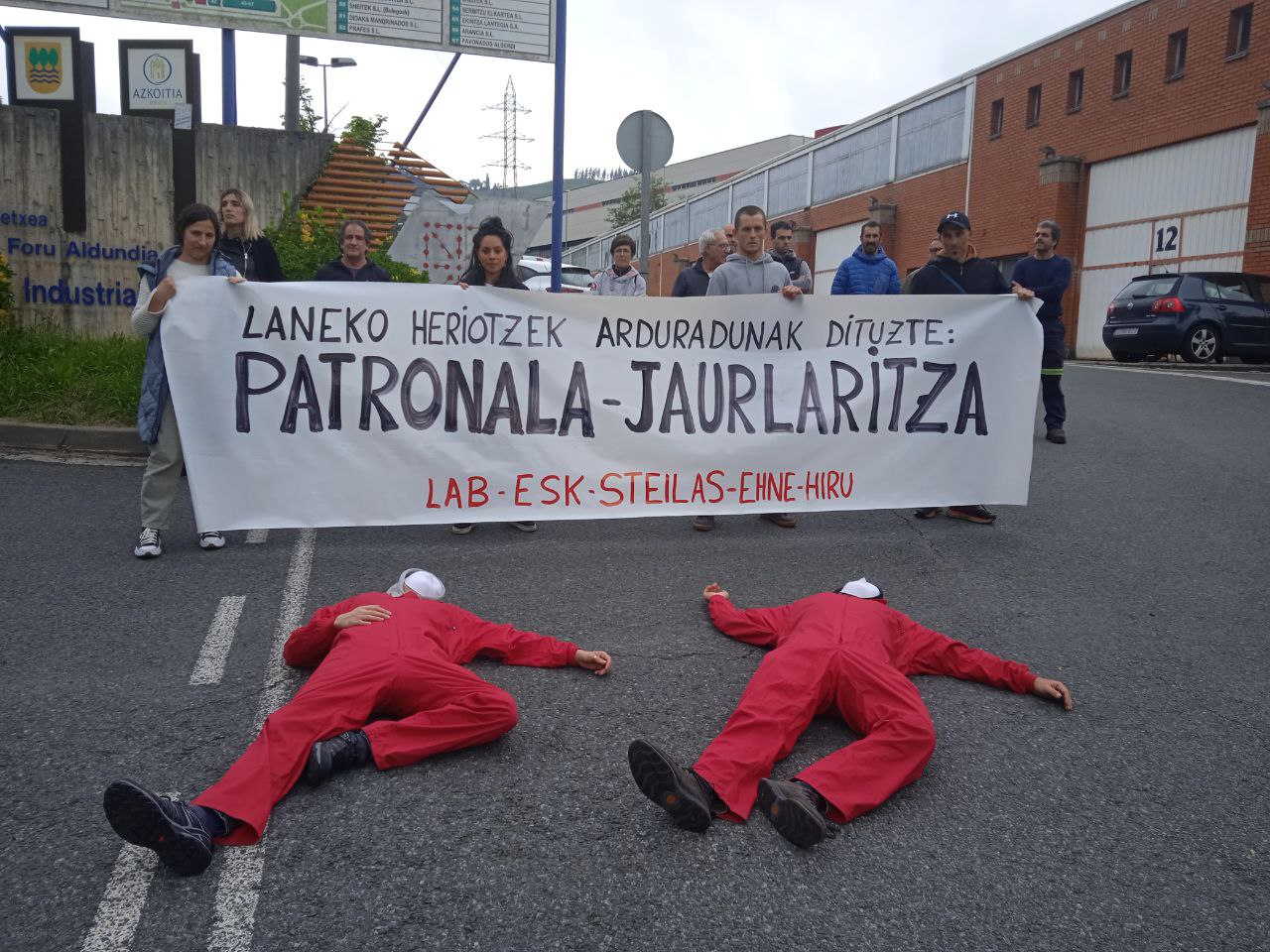"I don't want to go to a residence."
- It's natural from Arantzar, but it lives in Pamplona. We have been quoted in the Plaza del Castillo. Coffee has been greeted by half a dozen people during the interview. We say goodbye looking forward to finishing the interview, taking photos and getting back started.

You grew up in Arantza, the town where you went to study. How do you remember that time?
I was born in Arantza. We are four brothers and we were born all four at home. And all four of us were given the opportunity to learn the parents. We studied in the village until we could, but at that time you couldn't do high school in Arantza. I had an uncle at Oronoz Mugaire and there was a girls' college. I left there. It wasn't an official school, it was free. They gave us the classes there and we did the tests in Pamplona. When I had just finished high school, they began teaching teaching teachers. I started and learned the first two courses. But only three classmates stayed in third and the nuns told us they couldn't go on, we would have to come to Pamplona to study. And so we came.
When I was in Pamplona, I met Jorge Cortes Izal. He was one of the founders of the ikastolas in Pamplona. He was not Basque, but he was very Basque. His oldest son was studying Euskera in a hamlet in Arantza, through which he learned that I had just completed my teaching studies. Not one or two, he came to me to search my house.
And he started working in the ikastolas.En that time
there was a residence in San Sebastian, and there we were joined by Basque women who were going to be professors of the ikastolas. Some were studying magisterium and others were already doing internships in ikastolas. There, too, I arrived in September 1967. We lived in Matia Street in the Old Quarter, in two houses. I was touched by Hernani's ikastola, called Urumea, and throughout the course I was there, from class to class. It was a pleasure. The ikastola of that time was completely different from other schools! Boys and girls used to be together... It was very different. The person responsible was Pakita Arrangi, and in the afternoon we had meetings and formations. Kontxita Beitia came to us and gave us Euskera grammar classes, [Joxemiel] Barandiaran came, [José Antonio] Urbeltz also...
At that time Ez Dok Hamairu was in fashion! And think, in that neighborhood, that crew of Basque women ... One went out with this, the other with him, and we went to all the concerts! We were wonderful. I have my memories back then in San Sebastian. But from there I came to Pamplona, the only ikastola of the time. After spending a few years working, I got married. A Saturday at the end of the course and get married on Monday.
What changed this?
I was 22 years old and I married a widow. She had two little daughters. They welcomed me with open arms and I was very happy. Everything was very romantic. And then he told me that I had to quit the job. And I quit the job, unwillingly. Then there was still the dote system. It was Franco's time, and after the war, women were engaged in domestic work to care for their husband and their children. The messages back then were that for her husband to come home, she had to be nicely decorated. Laughing and smiling roulette. That her husband was going to come tired and already had to have her children ruled. Also from a sexual point of view, you had to rely on your husband's wishes. So far it didn't come, of course. I had never seen that machismo at home. Our parents were very open about this. Amatxi yes. When Amatxi came home, he would tell the girls to pick up the table, or do this or another, and our parents were already opposed. But I quit the job. It was so romantic!
.jpg)
"I was 22 years old and I married a widow. She had two little daughters. They welcomed me with open arms. Everything was very romantic. And then he told me I had to quit the job.”
Did your parents have a lot of openness, therefore?
Yes. In every way. For example, our parents have moved a lot. Sometimes we went from Arantza to the beach, to Hendaia. My mother and my mom were very good dressmakers and I remember a swimsuit made by them. A steering wheel. There were three bakers coming out of the village mornings, and until Igantzi was sold, we were going with one of them, sitting on wool bags at the back of the car. There we would catch the Baztanesa bus and take us to Irun. From there, by bus or topoz to Hendaia. Then nobody moved! And we were there. In Arantza, we also went to the mountain, when the parents finished the work. We have had a very good life. At home there was no money, but we were sent to study, two sisters and two brothers. The youngest did not want to study, but they gave us the opportunity at four. They made no distinction. I noticed the differences after marriage.
“After getting married, tiredness.” Yes,
of course. My son was born at the age of 23. He was 23 years old and three children. And after a few years, we left. I'm a hard and optimistic helmet, and when I was married, I found my way, if from here you couldn't, from there. In 1987, I pulled out the EGA and started working at AEK. In addition to household chores, that's it. But I didn't care. I loved it. I spent 15 years working at AEK, Tudela, Corella, Argedas, San Juan de Luz... That gave me air. But the children grew up, the youngest son also left home… And after 22 years married, I separated. Take the bags and celebrate them. I went back to my parents' house. I had nothing!
I went back to work at AEK in Pamplona, and so I continued. I would have liked to continue working on it. But I started thinking about the future. If I was going to take my life forward, I needed a dignified pension, and I predicted a very poor situation. So I decided to change my job. I started working at the municipal ikastolas. When I was 54, I took a stand and I took a place. And I've done my last years in public school. I've worked until I'm 70 to be able to get a pretty decent pay, and the last five courses I've spent on LAB, on unionism.
Her own concern for the pension, then brought her to the Polish area tico.Antes of
retiring, I saw that the issue of pensioners was shameful. So I decided to keep fighting for LAB as a pensioner, first. Then I got into Oneka. It was in the Community, and we decided to create it here too.
It is necessary. The pension account is changing a lot. I could have had a dignified pension with that of the last fifteen years listed earlier. Now it's not enough. It's getting worse and worse. And we don't realize it. We do concentrations in Pamplona every Monday, in the town hall square. Sometimes there are people who are not pensioners, even from some social movements they seem to come to support us. But we do not support each other, we are betting on their rights. Young people also look at us as if what we're doing had nothing to do with them. You don't realize it's going to come to you, and it's going to get worse. When we moved to the euro, it was mileurists who paid little. And now educated people earn less than that by working full-time. The rich are getting richer, the poor poorer, and as before, the young man is not young forever. With current wages and current laws, many will receive misery in their pension. For the pension problem to be of no one, it is young. Yours and the female.
Why the women's? Why is the Oneka Euskal Emakume Pensioners Platform necessary?
Look, when we started to focus, we were very few women. It looked like it wasn't our problem. The women we were going to ask men if they had left their wives preparing their meals, because of course, when we were doing them in the evenings, we would get a lot more women together. Now we're getting more and more, fortunately. Many of them without a pension. In fact, today there are about 100,000 women who do not receive a pension in the Basque Country. No pensions! In case of a husband, some will charge what they are entitled to as widows when the husband dies, but not their own. I do not say that you have to pay for domestic work, but when you retire you have to take into account the work done at home for so many years. We demand a minimum wage of EUR 1,200 and a minimum pension of EUR 1080, whether or not quoted.
Because today, who is hosting the cutbacks? Many times, women. If in a couple one of them stays at home, who stays? Wife. And it's said that one is the one who works and the other is not working. Yes? Stay at home and you already tell me! Domestic work is 24 hours. And in some of them you will be quiet, but in others you will not. If society were to do things right, there would be more conciliation possibilities, and if society were not so macho, women would not have to deal with the workload at home, they would not cover almost all the cuts, nor would there be so much gap in the area of pensions. But we have what we have.
Saving money from women's free work and not distributing it.
It is said that 30 per cent of the State ' s gross domestic product corresponds to the work carried out by women free of charge. And if we're not aware of it and don't ask for change, it's going to go on like this. Pandemic has served to make reality visible. So far, care has never been talked about, and all of a sudden it has interested us all. What happened? That the children have run out of school, that they had to be at home, that the parents were working and that they didn't take care of who. It seems normal to us to see older women on the street taking care of children. They grow up to their children with enough work and now, at the age of seventy, they are waiting for them. Many times bringing and receiving children to school, day after day. In Pandemic, in what we were called risk groups, that became impossible. And that's where the vacuum was detected. Something is wrong there.
.jpg)
"I don't want to live surrounded by old people. I want around me elderly, young and of all ages, as everything is in society. My wish is that. At the moment I'm fine, but I need help, and I don't know if I'm going to be able to receive it."
All your life taking care of others and the concern for who will take care of us in old age.
Care is very poorly organized. Even when women take what they do for free out into the job market, care tasks aren't done well enough. There is nothing else to do with the number of elderly people who have died in nursing homes during the pandemic. So far there has been no mention of residences. Because women are the majority of the workers, and also those who are there. That too has to be solved. I don't want to end up in a residence. According to an IMSERSO survey, almost nine out of ten older people don't want to go to such a place. Sometimes it's essential to take care of because you don't have anyone and because you're really sick. But also in these cases, can we not better serve the elderly? Do homes have to be out of town, like jails?
How do you picture your old age?
I don't want to go to a residence. With Oneka we have been in the Parliament of Navarra twice, and in one of them I said it. We need you to ask us what we want. There is a Home Care Service. What was public at the mayor of Joseba Asirón, has been privatized by Enrique Maya. It is a maximum of two hours a day, which for many is not enough. This service should be free and much wider. I want to live here in the Old Town of Pamplona. In the house I live in now I don't have an elevator, but for the moment I'm fine. I walk down the street, I go back to the neighborhood... I have a lot of stories here, my people are here, now I meet one acquaintance, then another... Everyone should choose where and how they want to live. Some are trying to create cooperative housing for the elderly. I wish them to live like them, but I would not. I don't want to live surrounded by old people. I want around me elderly, young and of all ages, as everything is in society. My wish is that. At the moment I'm fine, but I need help, and I don't know if I'm going to be able to receive it. It would be good if day centres were set up in the neighbourhoods. Instead of being few, large, designed for hundreds of people and outside the neighborhoods, be small, many and in the neighborhoods themselves. Let them promote the autonomy of the elderly, or at least not reduce it! Work has already begun on this People-Centered Care purpose, but there is generally a lot to improve.
But the opinion of the elderly does not seem to be of interest
to many… Our voice is not heard. It's not in the media, it's not in the centers of power, it's not in the realm of militancy. From an age onwards it is no longer valid and your voice has no listeners. After retirement you go directly to the limbo. We're the same ones who had the first fight. Before we were on the street, now as well, and so we will continue until we can. Because things are not right. Because people do not dare to fight. We've been doing concentrations for three years, week by week. The issue of pensions is increasingly being heard and we are called more from there and from here. No one has asked us our opinion. But we have heard our opinion. It has at least served this purpose.
What is the thought of the small trace of the complaints made on 28 April and that their only succession is the continuous chain of accidents and deaths of workers. In Azkoitia, once again in construction, a 62-year-old worker dies in a very common and therefore avoidable... [+]
When grandparents were young, retirement was represented as a time to enjoy life. Period of collection of the fruits of the work carried out during these years. What a satisfaction! It is a pity that young people today are never able to feel. You might think I'm a pessimist, but... [+]
























